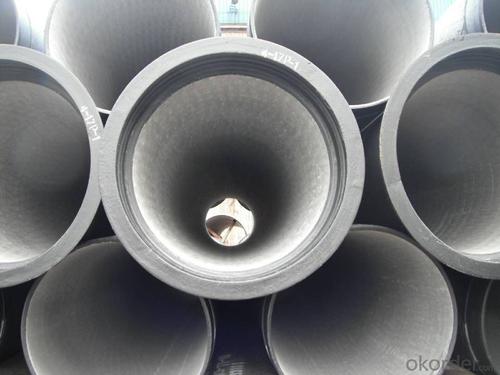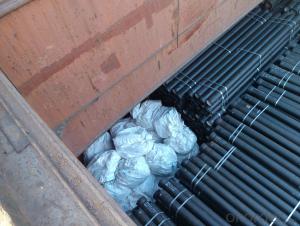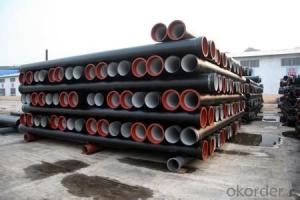DUCTILE IRON PIPE DN600 K9/C
- Loading Port:
- China Main Port
- Payment Terms:
- TT OR LC
- Min Order Qty:
- -
- Supply Capability:
- -
OKorder Service Pledge
OKorder Financial Service
You Might Also Like
Specification:
1) The standard of pipe: ISO2531:1998, K9
2) Effective length: 6m
3) Inner cement line: Portland cement line as per ISO4179
4) Zinc coating: at least 130g/m2 as per ISO8179
5) Bitumen painting: at least 70um as per ISO8179
6) With 100% quantity of NBR ring, or SBR ring, or EPDM ring as per ISO4633
7) DN80mm-800mm
8) High strength, lighter than grey iron, good corrosion resistance, no furring, small flow resistance, easy fixing, long life tome about 100 yeas
9) Produced by Hangzhou chunfeng machine
10) Checked by automatic inspection equipment
11) Composition:
Chemical composition | |||
Chemical composition | Ductile Cast Iron Pipe (%) | Grey iron pipe (%) | Steel pipe (%) |
C | 3.5-4.0 | 3.2-3.8 | 0.1-0.2 |
Si | 1.9-2.6 | 1.4-2.2 | 0.15-0.4 |
Mn | 0.15-0.45 | 0.4-0.6 | 0.3-0.6 |
P | ≤0.06 | ≤0.3 | 0.02-0.03 |
S | ≤0.02 | ≤0.1 | 0.02-0.03 |
Mg | 0.03-0.06 |
|
|
12) Feature:
Mechanical properties | |||
| Ductile Cast Iron Pipe | Grey Iron Pipe | Steel Pipe |
Tensile Strength(Mpa) | ≥420 | 150-260 | ≥400 |
Yield Strength(Mpa) | ≥300 | No Confirmation | No Confirmation |
Bending Strength(Mpa) | ≥590 | 200-360 | ≥400 |
Elongation (%) | ≥10 | Neglected | ≥18 |
Brinell Hardness(HBS) | ≤230 | ≤230 | About 140 |
13) T type mechanical joint
14) Packing: in bulk or container
- Q: What are the different methods for joining ductile iron pipe?
- There are several methods for joining ductile iron pipe, including mechanical joints, flanged joints, push-on joints, and restrained joints. Mechanical joints use a rubber gasket and a series of bolts and glands to create a secure connection. Flanged joints involve bolting two flanges together with a gasket in between. Push-on joints utilize a rubber gasket and require the pipe to be pushed into the joint. Restrained joints use a combination of mechanical joints and a restraining gland to prevent movement and provide a secure connection.
- Q: The difference between ductile cast iron pipe and machine-made cast iron pipe
- Production process is different, ductile iron pipe mainly through intermediate frequency furnace heating, annealing, and then do cement lining cement lining production, the mechanism of cast iron pipe does not make cement lining.
- Q: Can ductile iron pipes be used for bridge drainage systems?
- Indeed, bridge drainage systems can make use of ductile iron pipes. Ductile iron, a resilient material, finds widespread use in numerous applications, such as water and sewage systems, owing to its strength and durability. With exceptional resistance to corrosion, it is capable of enduring substantial loads and pressure, rendering it an ideal choice for bridge drainage systems. Moreover, the smooth inner surface of ductile iron pipes facilitates efficient water flow, preventing the occurrence of clogs and blockages. Therefore, given their robustness, longevity, and capacity to handle the necessary water flow, ductile iron pipes prove to be a fitting option for bridge drainage systems.
- Q: How does ductile iron pipe perform in areas with high groundwater contamination?
- Ductile iron pipe performs well in areas with high groundwater contamination due to its corrosion-resistant properties. It can withstand the corrosive effects of contaminated water and maintain its structural integrity over time, making it a reliable choice for such environments.
- Q: How does ductile iron pipe perform in areas with high water hammer?
- Areas with high water hammer are well-suited for the use of ductile iron pipe, as it exhibits exceptional performance in these conditions. The robustness and durability of ductile iron enable it to withstand the forceful impact of water hammer without experiencing significant damage. Water hammer is characterized by a sudden surge in pressure resulting from the rapid alteration of water flow direction or velocity, often occurring when valves are swiftly closed. This abrupt pressure change places substantial stress on pipes, potentially leading to ruptures or failures. Nevertheless, ductile iron pipes possess outstanding resistance to such impact due to their unique composition and manufacturing processes. These pipes are comprised of a blend of iron, carbon, and small quantities of other elements like silicon and magnesium. The formation of graphite nodules during manufacturing grants ductile iron its exceptional strength and flexibility, rendering it less prone to cracking or breaking under pressure. In environments where water hammer is prevalent, ductile iron pipe's inherent strength and resilience allow it to absorb and dissipate the force generated by water hammer events. Its capacity to endure sudden pressure changes aids in preventing pipe failures, thereby minimizing the risk of leaks or bursts. Furthermore, the smooth inner surface of ductile iron pipes reduces the likelihood of water hammer incidents by minimizing turbulence and maintaining a steady flow. This particular attribute assists in mitigating the impact of water hammer on the pipe system. Overall, ductile iron pipe emerges as an ideal choice for areas prone to high water hammer due to its exceptional strength, impact resistance, and ability to withstand abrupt pressure changes. Its performance under such conditions ensures the longevity and dependability of water distribution systems.
- Q: What are the advantages and disadvantages of spheroidal graphite cast iron?
- Compared with cast iron, ductile iron has an absolute advantage in strength. The tensile strength of ductile iron is 60K, while the tensile strength of cast iron is only 31k. The yield strength of ductile iron is 40K, while the cast iron does not show yield strength, and eventually breaks. The strength to cost ratio of ductile iron is far superior to that of cast iron.
- Q: Can ductile iron pipes be used for stormwater management?
- Yes, ductile iron pipes can be used for stormwater management. Ductile iron is a strong and durable material that is resistant to corrosion and can withstand the high flow rates and pressures typically associated with stormwater management systems. These pipes have been widely used for various applications, including stormwater drainage and sewage systems. Their ability to handle heavy loads and withstand environmental factors makes them a suitable choice for stormwater management, ensuring efficient water flow and preventing flooding in urban areas. Moreover, ductile iron pipes have a long lifespan, reducing the need for frequent maintenance and replacement, making them a cost-effective choice for stormwater management infrastructure.
- Q: What is the average weight of ductile iron pipe?
- The size and thickness of ductile iron pipe can cause fluctuations in its average weight. Typically, smaller diameters of ductile iron pipe weigh around 3.5 pounds per foot, while larger diameters can exceed 20 pounds per foot. It is essential to acknowledge that these weights are rough estimates and might slightly differ depending on the manufacturer and pipe specifications.
- Q: Which is good for water polo cast iron pipe steel pipe?
- In summary, if the demand is not high, the use of stable environment, pressure and vibration is not a place recommend the use of ductile iron pipe; if is an important facility for high requirements or site conditions, abnormal conditions, vibration and impact may be relatively large, with ordinary seamless steel tube.
- Q: How are ductile iron pipes connected together?
- Ductile iron pipes are typically connected together using a variety of methods, depending on the specific application and requirements. The most common method of connecting ductile iron pipes is through mechanical joint fittings. These fittings consist of a bell end on one pipe and a spigot end on the other, which are joined together using a rubber gasket and bolts or clamps. The rubber gasket provides a watertight seal, while the bolts or clamps secure the joint and prevent any movement or separation. Another method of connecting ductile iron pipes is through flanged joints. Flanged joints involve attaching a flange to the end of each pipe, which are then bolted together using bolts and nuts. This method is commonly used in larger diameter pipes or in situations where the pipes need to be easily disassembled. In addition to mechanical joint fittings and flanged joints, ductile iron pipes can also be connected using push-on or restrained joint fittings. Push-on joints utilize a rubber gasket that is pushed onto the spigot end of the pipe, creating a secure and watertight connection. Restrained joints, on the other hand, incorporate additional features such as welded-on collars or mechanical devices to prevent movement and provide added strength to the joint. Overall, the method of connecting ductile iron pipes together depends on factors such as pipe diameter, pressure requirements, and the specific application. It is important to follow the manufacturer's guidelines and industry standards to ensure proper installation and reliable performance of the connected pipes.
Send your message to us
DUCTILE IRON PIPE DN600 K9/C
- Loading Port:
- China Main Port
- Payment Terms:
- TT OR LC
- Min Order Qty:
- -
- Supply Capability:
- -
OKorder Service Pledge
OKorder Financial Service
Similar products
Hot products
Hot Searches
Related keywords



























